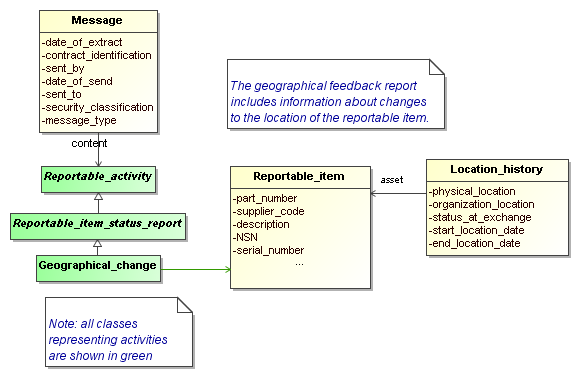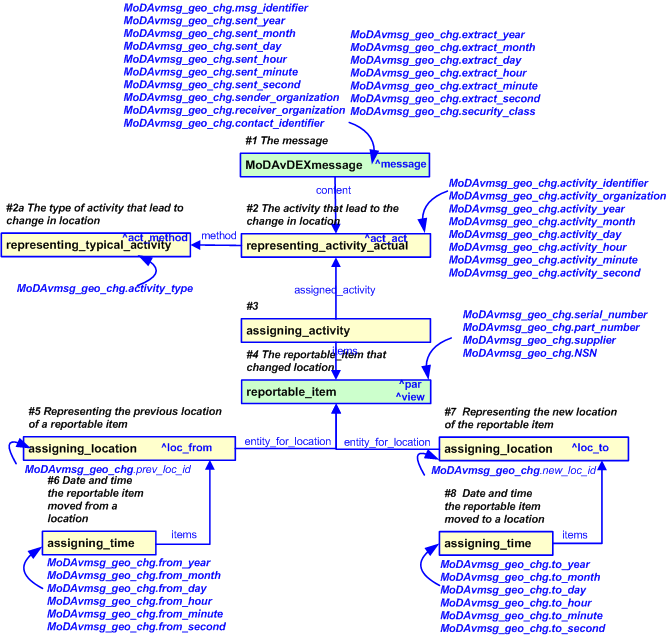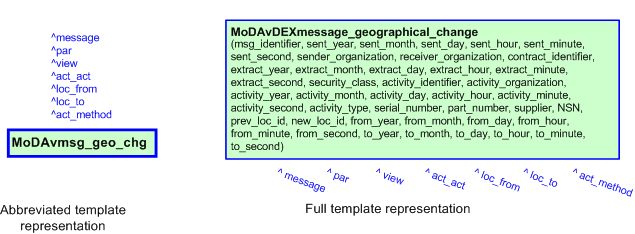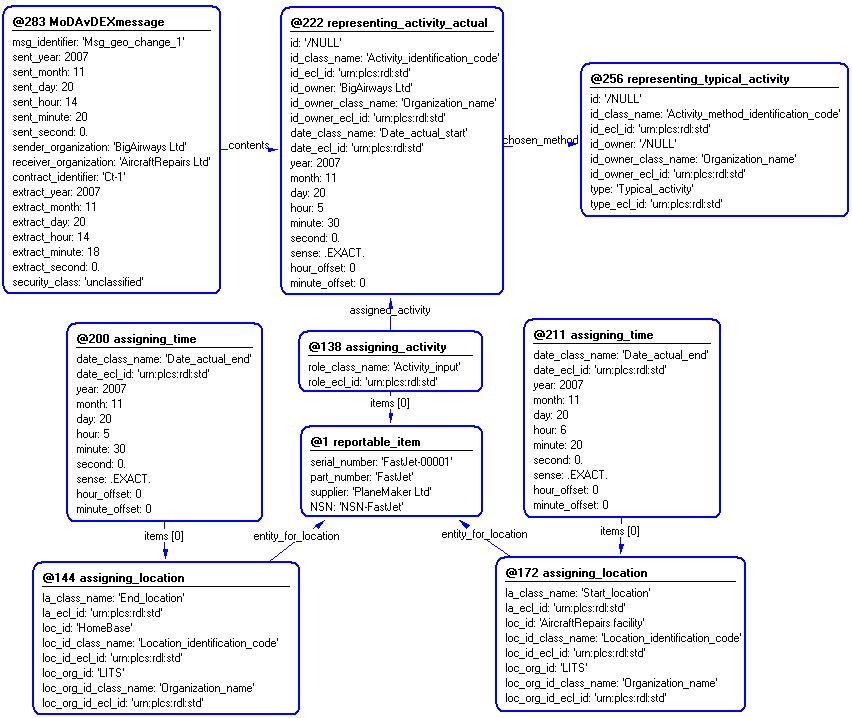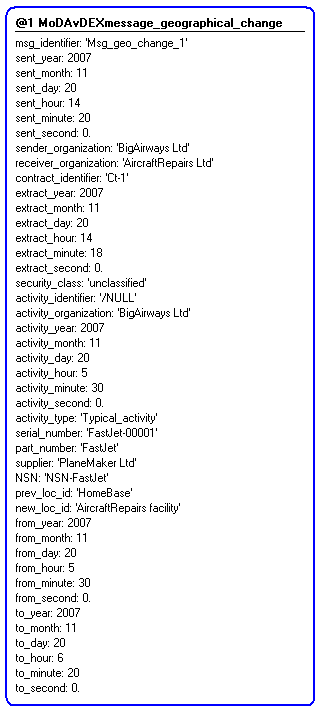Template:— MoDAvDEXmessage_geographical_change (MoDAvmsg_geo_chg)
Context:— MoDAvDEX |
Date: 2008/02/03 07:53:26
Revision: 1.14
|
This section specifies the template MoDAvDEXmessage_geographical_change.
NOTE
The template has been defined in the context of
MoDAvDEX.
Refer to the business context for details of related templates.
NOTE
An explanation of a template and the associated instantiation path is
provided in the
Template overview
section.
This template describes how to represent a message reporting change of a reportable
item's geographical location.
It enables the identification of the location that the reportable item's has been moved from
and the location that it has been moved to. The location could be either a physical or organizational.
For further information about the representation of a change of location of a reportable item, see
Aviation Maintenance DEX: Representing reportable Item location
Geographical change messages represent a record of the change of location of a reportable item.
The messages are triggered whenever a location change occurs.
The EXPRESS-G diagram in
Figure
2
shows the templates and EXPRESS entities that are required
to represent the template
"MoDAvDEXmessage_geographical_change".
The text highlighted in blue shows the template parameters.
Figure 2 — An EXPRESS-G representation of the Information model for MoDAvDEXmessage_geographical_change
The graphic for the template to be used in other EXPRESS-G diagrams
is shown in Figure
3
below.
Figure 3 — The graphical representation of the MoDAvDEXmessage_geographical_change template
The following input parameters are defined for this template:
The identifier of the message.
Calendar_date year_component of the date that the message was sent.
Calendar_date month_component of the date that the message was sent.
Calendar_date day_component of the date that the message was sent.
Local_time hour_component of the date and time that the message was sent.
Local_time minute_component of the date and time that the message was sent. This
parameter is optional. If not given, it will remain unset.
Local_time second_component of the date and time that the message was sent. This
parameter is optional. If not given, it will remain unset.
The name or identifier of the sending organization.
The name or identifier of the receiving organization.
The name or identifier of the contract.
Calendar_date year_component of the date that the information in the message was
extracted from the sending system.
Calendar_date month_component of the date that the information in the message
was extracted from the sending system.
Calendar_date day_component of the date that the information in the message was
extracted from the sending system.
Local_time hour_component of the date that the information in the message was
extracted from the sending system.
Local_time minute_component of the date that the information in the message was
extracted from the sending system. This parameter is optional. If not given, it will remain
unset.
Local_time day_component of the date and time the message is extracted. This
parameter is optional. If not given, it will remain unset.
The following classes and their sub-classes can be used:
classifications: [ModAvDEX_Security_classification]![[warning:]](../../../../../../images/dex/warning.gif) Error RDL4: The URI urn:plcs:rdl:LITS is not listed in dexlib/data/refdata/rdl_index.xml
Error RDL4: The URI urn:plcs:rdl:LITS is not listed in dexlib/data/refdata/rdl_index.xml
The identifier of the activity that led to the change of location.
The identifier of the organization who conducted the activity.
Calendar_date year_component of the date that the activity to change the location was started.
Calendar_date month_component of the date that the activity to change the location was started.
Calendar_date day_component of the date that the activity to change the location was started.
Local_time year_component of the date and time that the activity to change the location was started.
Local_time month_component of the date and time that the activity to change the location was started.
This parameter is optional. If not given, it will remain unset.
Local_time day_component of the date and time the activity was conducted.
This parameter is optional. If not given, it will remain unset.
The class defining the type of activity that changed the location.
The following classes and their sub-classes can be used:
The serial_number of the reportable item whose location has changed.
The part_number of the reportable item whose location has changed.
supplier (Default=/NULL,Type='STRING', Optional)
The supplier of the reportable item whose location has changed.
NSN (Default=/NULL,Type='STRING', Optional)
The NSN of the reportable item whose location has changed.
The identifier of the reportable item's previous location.
The identifier of the reportable item's new location.
The year_component of the date that the reportable item left the previous location.
The month_component of the date that the reportable item left the previous location.
The day_component of the date that the reportable item left the previous location.
The hour_component of the date that the reportable item arrived at the new location. of the date that the reportable
item left the previous location.
The minute_component of the date that the reportable item left the previous location.
This parameter is optional. If not given, it will remain unset.
The second_component of the date that the reportable item left the previous location.
This parameter is optional. If not given, it will remain unset.
The year_component of the date that the reportable item arrived at the new location.
The month_component of the date that the reportable item arrived at the new location.
The day_component of the date that the reportable item arrived at the new location.
The hour_component of the date that the reportable item arrived at the new location.
The minute_component of the date that the reportable item arrived at the new location.
This parameter is optional. If not given, it will remain unset.
The second_component of the date that the reportable item arrived at the new location.
This parameter is optional. If not given, it will remain unset.
The following reference parameters are defined for this template:
Allow the
Message
entity instantiated in this path to be referenced when this template is used.
Note: The
Message
entity can be referenced in a template path by:
%^target = $MoDAvDEXmessage_geographical_change.message%
where
target
is the parameter to which the
Message
is bound.
Allow the
Product_as_realized
entity instantiated in this path to be referenced when this template is used.
%^target = $MoDAvDEXmessage_geographical_change.par%
%^target = $MoDAvDEXmessage_geographical_change.view%
Allow the
Activity_actual
entity instantiated in this path to be referenced when this template is used.
%^target = $MoDAvDEXmessage_geographical_change.act_act%
Allow the
Location_assignment
entity instantiated in this path to be referenced when this template is used.
%^target = $MoDAvDEXmessage_geographical_change.loc_from%
Allow the
Location_assignment
entity instantiated in this path to be referenced when this template is used.
%^target = $MoDAvDEXmessage_geographical_change.loc_to%
Allow the
Activity_method
entity instantiated in this path to be referenced when this template is used.
%^target = $MoDAvDEXmessage_geographical_change.act_method%
The instantiation path shown below specifies the entities that are to be
instantiated by the template.
A description of templates and the syntax for the instantiation path is
provided in the
Templates Help/Information section.
/
representing_typical_activity(
id='/NULL',
id_class_name='Activity_method_identification_code',
id_ecl_id='urn:plcs:rdl:std',
id_owner='/NULL',
id_owner_class_name='Organization_name',
id_owner_ecl_id='urn:plcs:rdl:std',
type=@activity_type,
type_ecl_id='urn:plcs:rdl:std')/
%^act_method = $representing_typical_activity.act_method%
-- instantiate activity_actual /
representing_activity_actual(
id=@activity_identifier,
id_class_name='Activity_identification_code',
id_ecl_id='urn:plcs:rdl:std',
id_owner=@activity_organization,
id_owner_class_name='Organization_name',
id_owner_ecl_id='urn:plcs:rdl:std',
method=^act_method,
date_class_name='Date_actual_start',
date_ecl_id='urn:plcs:rdl:std',
year=@activity_year,
month=@activity_month,
day=@activity_day,
hour=@activity_hour,
minute=@activity_minute,
second=@activity_second,
sense='.EXACT.',
hour_offset='0',
minute_offset='0')/
%^act_act = $representing_activity_actual.act_act%
/
MoDAvDEXmessage(
msg_identifier=@msg_identifier,
sent_year=@sent_year,
sent_month=@sent_month,
sent_day=@sent_day,
sent_hour=@sent_hour,
sent_minute=@sent_minute,
sent_second=@sent_second,
sender_organization=@sender_organization,
receiver_organization=@receiver_organization,
contract_identifier=@contract_identifier,
extract_year=@extract_year,
extract_month=@extract_month,
extract_day=@extract_day,
extract_hour=@extract_hour,
extract_minute=@extract_minute,
extract_second=@extract_second,
security_class=@security_class,
content=^act_act)/
%^message = $MoDAvDEXmessage.message%
-- Instantiate the reportable item /
reportable_item(
serial_number=@serial_number,
part_number=@part_number,
supplier=@supplier,
NSN=@NSN)/
%^par = $reportable_item.par%
%^view = $reportable_item.view%
-- instantiate assigning_activity /
assigning_activity(
role_class_name='Activity_input',
role_ecl_id='urn:plcs:rdl:std',
assigned_activity=^act_act,
items=^par)/
-- instantiate assigning_location for the new location /
assigning_location(
la_class_name='End_location',
la_ecl_id='urn:plcs:rdl:std',
loc_id=@new_loc_id,
loc_id_class_name='Location_identification_code',
loc_id_ecl_id='urn:plcs:rdl:std',
loc_org_id='LITS',
loc_org_id_class_name='Organization_name',
loc_org_id_ecl_id='urn:plcs:rdl:std',
entity_for_location=^par)/
%^loc_to = $assigning_location.locn_asst%
-- instantiate assigning_location for the previous location /
assigning_location(
la_class_name='Start_location',
la_ecl_id='urn:plcs:rdl:std',
loc_id=@prev_loc_id,
loc_id_class_name='Location_identification_code',
loc_id_ecl_id='urn:plcs:rdl:std',
loc_org_id='LITS',
loc_org_id_class_name='Organization_name',
loc_org_id_ecl_id='urn:plcs:rdl:std',
entity_for_location=^par)/
%^loc_from = $assigning_location.locn_asst%
-- instantiate assigning_time for date arrived at new location /
assigning_time(
date_class_name='Date_actual_start',
date_ecl_id='urn:plcs:rdl:std',
year=@to_year,
month=@to_month,
day=@to_day,
hour=@to_hour,
minute=@to_minute,
second=@to_second,
sense='.EXACT.',
hour_offset='0',
minute_offset='0',
items=^loc_to)/
-- instantiate assigning_time for date left previous location /
assigning_time(
date_class_name='Date_actual_end',
date_ecl_id='urn:plcs:rdl:std',
year=@from_year,
month=@from_month,
day=@from_day,
hour=@from_hour,
minute=@from_minute,
second=@from_second,
sense='.EXACT.',
hour_offset='0',
minute_offset='0',
items=^loc_from)/
The instance diagram in Figure
4
shows an example of the EXPRESS entities and templates that are instantiated by the template:
/MoDAvDEXmessage_geographical_change(msg_identifier='Msg_geo_change_1', sent_year='2007', sent_month='11', sent_day='20', sent_hour='14', sent_minute='20', sent_second='0', sender_organization='BigAirways Ltd', receiver_organization='AircraftRepairs Ltd', contract_identifier='Ct-1', extract_year='2007', extract_month='12', extract_day='20', extract_hour='14', extract_minute='18', extract_second='0', security_class='Unclassified', activity_identifier='/NULL', activity_organization='BigAirways Ltd', activity_year='2007', activity_month='11', activity_day='20', activity_hour='5', activity_minute='30', activity_second='0', activity_type='Typical_activity', serial_number='FastJet-00001', part_number='FastJet', supplier='PlaneMaker Ltd', NSN='NSN-FastJet', prev_loc_id='HomeBase', new_loc_id='ForeignBase', from_year='2007', from_month='11', from_day='20', from_hour='5', from_minute='30', from_second='0', to_year='2007', to_month='11', to_day='20', to_hour='6', to_minute='20', to_second='0')/
(an illustration of the consolidated MoDAvDEXmessage_geographical_change template is shown in
Figure
5 below.)
Figure 4 — Entities instantiated by MoDAvDEXmessage_geographical_change template
The instance diagram in
Figure
5
shows the graphic symbol for the template that is to be
used in other instance diagrams. The example template is:
/MoDAvDEXmessage_geographical_change(msg_identifier='Msg_geo_change_1', sent_year='2007', sent_month='11', sent_day='20', sent_hour='14', sent_minute='20', sent_second='0', sender_organization='BigAirways Ltd', receiver_organization='AircraftRepairs Ltd', contract_identifier='Ct-1', extract_year='2007', extract_month='12', extract_day='20', extract_hour='14', extract_minute='18', extract_second='0', security_class='Unclassified', activity_identifier='/NULL', activity_organization='BigAirways Ltd', activity_year='2007', activity_month='11', activity_day='20', activity_hour='5', activity_minute='30', activity_second='0', activity_type='Typical_activity', serial_number='FastJet-00001', part_number='FastJet', supplier='PlaneMaker Ltd', NSN='NSN-FastJet', prev_loc_id='HomeBase', new_loc_id='ForeignBase', from_year='2007', from_month='11', from_day='20', from_hour='5', from_minute='30', from_second='0', to_year='2007', to_month='11', to_day='20', to_hour='6', to_minute='20', to_second='0')/
Figure 5 — Instantiation of MoDAvDEXmessage_geographical_change template
Characterizations
No common characterizations of the template
MoDAvDEXmessage_geographical_change
have been identified. However, the ISO 10303-239 EXPRESS model
may enable other assignments to the entities instantiated by the template.
